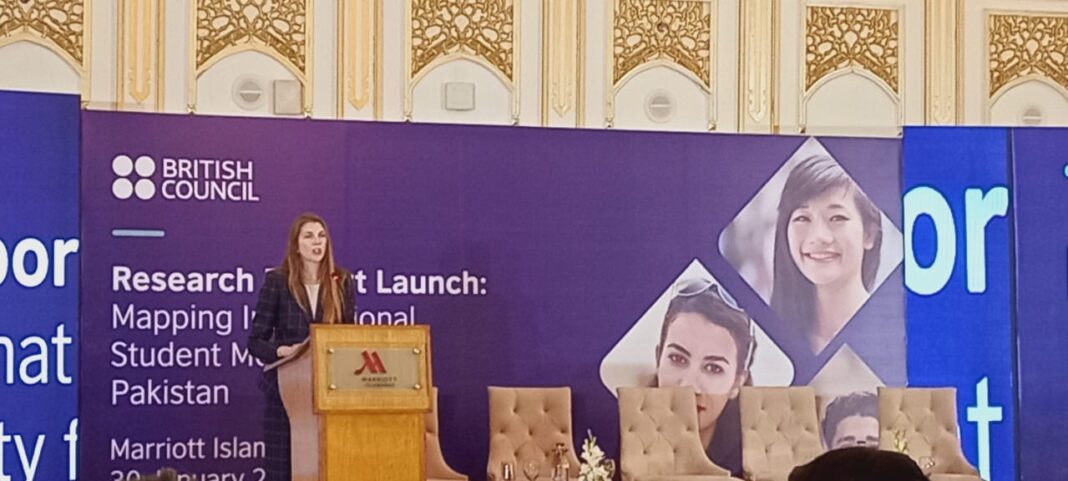By: Wajiha Imtiaz
ISLAMABAD: The report launch event, held in Islamabad on 30th January 2024 started with an Introduction and Welcome to the participants. Ms Jane Marriott, British High Commissioner to the Islamic Republic of Pakistan delivered the welcome speech highlighting the UK’s commitment to life-changing opportunities for young people. She mentioned how there is a 285% increase in the number of new students from Pakistan in 2021 as compared to 2017-18. Regarding social mobility, she mentioned how Rawalpindi and Peshawar are on the rise for social mobility. This enables students to bring world-class education back to Pakistan. She further elaborated on ‘World class’ as 1 in 4 leaders had studied in the UK. UK is home to 38% of noble laureates, who chose to study in the UK over their career spans. (“So studying in the UK means a greater chance of becoming a Nobel laureate”, Jane shared a laugh with the audience). She mentioned there is an increased demand for certifications in Data Science and Artificial Intelligence AI. “Education is central to the conversation we need to have here, the UK has already invested 800 million pounds in our bilateral education program, and both countries look to success in the future” Jane emphasized.
Sandeepa Sahay Regional head of Education Insights South Asia, discussed the methodology, analysis, results, and conclusions for the report ‘Mapping International Student Mobility from Pakistan’. She discussed how desk research and interviews with agents and UK universities suggest that Pakistan’s metropolitan cities (Lahore, Karachi, Islamabad, Rawalpindi, and Peshawar) continue to drive growth in outbound mobility. She described the data from three data sets collected from 1) selected Higher Education Institutions HEI in the UK, and 2) Enroly: an enterprise software that supports the CAS, visa, and arrival of international students. 3) IELTS centers, British Council own records. She concluded outbound mobility for metropolitan cities is exceeding, creating a need further in tier 2, and tier 3 cities. Pakistan is the third largest country with a young population, keeping in view the influencers the subnational mapping data provides a framework to analyze the work areas in terms of educational opportunities for the Pakistani youth.
The presentation was followed by a panel discussion titled: “Navigating Trends and Opportunities in International Student Mobility”. It was moderated by the esteemed Ms. Sarah Parvez, Head of Education British Council Pakistan, supported by her organizing managers at British Council Mr. Usman Khalid and Mr. Haroon Rashid. The discussion contributors included: Ms. Sneha Lala (Deputy Head of Communications, Foreign, Commonwealth and Development Office); Ms. Shaina Saif (College Counselor, Roots IVY); Dr. Maryam Rab (Head of Research Programmes British Council Pakistan) and Mr. Faisal Mehmood (Country Director, TCL global Islamabad). Dr. Maryam Rab shared how in her days social connectivity was not as facilitating as it is now in terms of access to scholarships and opportunities. She mentioned how Agriculture University Faisalabad has the highest ratio of partnerships, especially with the UK universities, students now can access UK libraries and classrooms in the UK. She emphasized the behavioral and cultural challenges around education generally, and how financial challenges can be overcome by the flexible payment facilities through endowment funds and awareness of ‘Diaspora networks’ and informed choices. Ms. Shaina Saif Highlighted the importance of the Alumni network and how alumni can help students in smaller cities with great potential. Ms. Sneha Lala elaborated on the importance of ‘push factors’ that lead to students aiming for UK universities as their target institutes. She discussed how smaller span degree programs (both under and post-graduate) can increase accessibility to international education, for Pakistani students. Mr. Faisal Mehmood talked about TNE programs and how the possibility of transferring credits can ease the process of foreign education for students. In the end, Mr. James Hampson (Country Director of Pakistan at the British Council) presented the closing remarks. He said that the report is designed to help people make choices for higher education, with Scholarship programs such as GREAT, Women in STEM, and Charles Wallace. He said a huge success is that around 10,000 students study for TNE degrees which is an important part of the relationship between the UK and Pakistan. Transnational education (TNE) refers to study programs or educational services in which the learners are located in a country different from the one where the awarding institution is based (UNESCO/Council of Europe 2001). Transnational education (TNE) is an increasingly important feature of the modern-day internationalized higher education field. He applauded the efforts of the British Council in promoting Education through the English language, art, and culture and for creating opportunities for millions of people, as in his words: “When Pakistan succeeds, the UK succeeds.”



